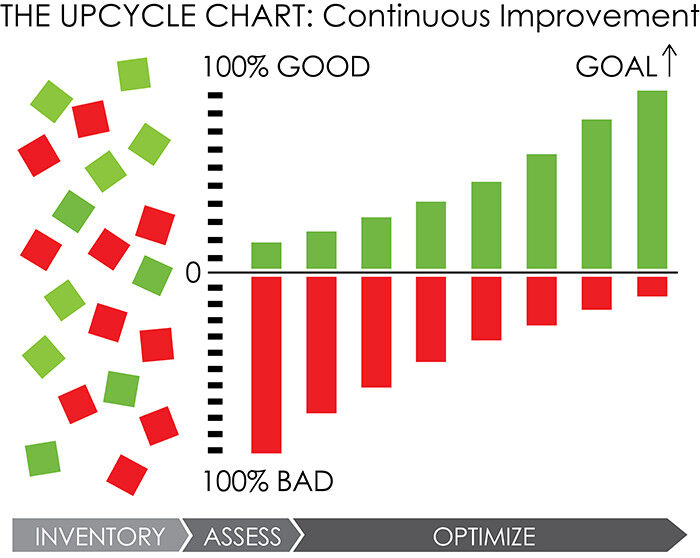During his plenary presentation last night at the SB ’13 conference, designer, author and sustainability thought leader William McDonough announced a new partnership between McDonough Innovation and Waste Management, Inc — North America’s largest environmental solutions provider and residential recycler. The collaboration will help foster and guide future product and packaging design innovation among industry-leading companies.
The Waste Management McDonough Sustainable Innovation Collaborative will directly serve producers, manufacturers, retailers and suppliers of packaged goods and products as they strive to advance their sustainability objectives and results. Product and packaging design for recyclability as well as careful consideration of ecological and human health will be among the collaborative’s goals.
“This is a unique new avenue for innovation,” McDonough said. “What we have previously thought of as ‘waste streams’ can be transformed into positive, safe, healthy resource reuse systems that bring value to their communities in many forms. This is a key element of the Cradle to Cradle vision which chemist Michael Braungart and I developed: We see resources as nutrients in the biosphere or technosphere. Once you reframe materials this way, the future of abundance becomes possible.”
“Over the 40 years since consumer recycling began in the United States, we’ve had the privilege of serving a wide spectrum of leading firms and communities in developing, setting and meeting ambitious recycling and sustainability goals,” said David P. Steiner, President and Chief Executive Officer of Waste Management. “Now we’re prepared to help nurture and support further progress not only in sustainable packaging but also in addressing the full product life-cycle, with a practical eye toward waste elimination, reducing environmental impact and increasing value from waste.”
McDonough added: “Designing up from the dumpster is one reason why I am personally very excited to launch the Sustainable Innovation Collaborative with Waste Management. Working together, we will use the tools of design, science and principled business practices in collaboration with manufactures, retailers, distributors, consumers and recyclers of products and packaging to profitably work toward eliminating the very concept of waste. We can link healthy, safe materials and sophisticated logistics, and this allows us to bring a uniquely valuable perspective for continuous innovation and quality improvement with supply-side and demand-side collaborators.”
The Sustainable Innovation Collaborative broadens the range of consulting experience that both Waste Management and McDonough Innovation already offer to help firms make sustainability-minded decisions and measure results. Business leaders pursuing enhanced design innovation now have a collaborative enterprise to help them make additional strides in their sustainability efforts.
“Over the years, enlightened manufacturers have taken positive and forward-looking steps to lighten their footprint on the environment,” said Tom Carpenter — Director, Sustainability Services at Waste Management. “As those efforts have progressed, we now see a growing demand by these same manufacturers to address every link along supply chains that produce residual waste. This collaborative will combine design, recycling and material science expertise to guide these next generation strategies.”
The collaborative intends to serve companies and communities at all scales and across industries. “We anticipate working with many groups,” McDonough said. “In many ways, that is the point. Every single company and community has some interaction with or contribution to the waste stream that we generate, and therefore they all have a stake in seeking to transform that system and optimize resource use.”
Added Carpenter: “The time has come for top companies to further assert their leadership and for others to build their profiles in sustainable product design and packaging. Via the Waste Management McDonough Sustainable Innovation Collaborative, we’ve created a means to help suppliers revolutionize their waste streams and create material benefits and value for our customers and consumers alike.”



